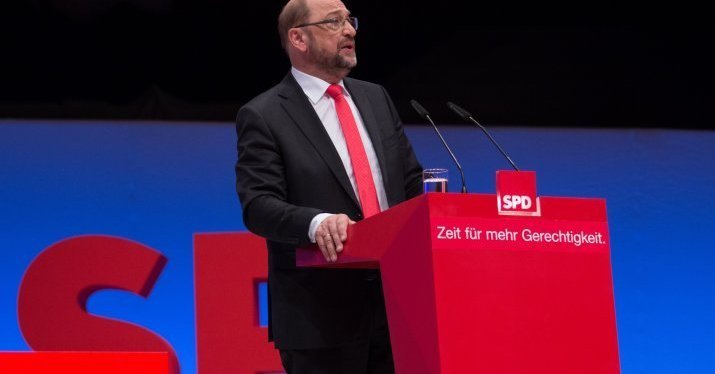In the end, pragmatism won. After a categorical opposition which lasted more than two months, the SPD finally accepted to open the “Sondierungsgespräche” with the CDU-CSU, to unlock a process that had been stuck since the withdrawal of the FDP liberal party from the talks with the Greens and the CDU-CSU.
The German social-democracy had been tempted to follow an opposition therapy since the federal elections’ catastrophic results in the end of September. However, Christian Lindner, the FDP leader, chose a different way. By closing the door to a “Jamaica” coalition, he put a high pressure on the SPD, Angela Merkel’s last chance to avoid the formation of an untenable and minority government regarding the country’s current situation, or the organization of new elections.
The failure of a “Jamaica” coalition may not be bad news in itself. Divergences between the different parties were affecting too many fields, from the tax system to climate policy, the refugee crisis and of course the European policy.
The signature of a coalition agreement would have been a big surprise. Holding it for four years would have been a real miracle. For all that, the parliamentary opposition would have been the best solution for a worn-out SPD, which suffered from its governmental experience and didn’t manage to stand out from the big conservative partner. Consequently, that is much to Martin Schulz’ credit to have accepted the idea of talks, even if the national and European pressure was getting bigger.
The SPD will really have to stand out from the CDU-CSU…
If a new “Grosse Koalition” should see the light of day - the third for Chancellor Merkel -, the SPD will have to assert its own position on economic and social issues. The candidate Schulz did not manage to differentiate himself from the candidate Merkel because, to be honest, he did not really want to.
Given that his candidacy to the Chancellery was unforeseen, M. Schulz was not able to elaborate a program answering to German voters’ needs for change, and he threw in the towel a couple of weeks before the election. His lack of political experience in Germany also highly influenced his performance. After all, the political culture within the European institutions is quite different from the one of a country like Germany, despite the common search for a cross-party consensus.
This time, things are very different. M. Schulz must show his party that he is the leader and with this aim in mind, that he has a real negotiating power in front of Angela Merkel concerning the economic and social policy to choose in order to cure a more and more divided German society - what the AfD largely benefited from. It is up to him to use it wisely, without getting the Bavarian CSU - the (slightly cumbersome) CDU’s partner - back up. In any case, negotiations will take months.
…including concerning Germany’s European policy
With all these elements in mind, Martin Schulz gave his speech in front of the SPD delegates during the convention. The occasion for the former President of the European Parliament to develop a very ambitious vision for the future of the Union, by proposing no more no less than the creation of the “United States of Europe” within a 10-year period. For this, he advocates the writing of a constitutional treaty (like in 2005 after the famous speech of Joschka Fischer, Minister of Foreign Affairs of Gerhard Schröder) in which all the actors from civil society must be engaged. A scarcely concealed allusion to Emmanuel Macron’s proposals. Still according to Schulz, the countries rejecting the results of this convention will be ipso facto excluded from the Union.
So much ambition and resolution can surprise from a man obsessed by the search for consensus and refusing any division. Nonetheless, this courageous stance brings very good news for Europe and especially for the French president, who finally obtained a tangible German answer to his speeches in Athens and La Sorbonne from last September.
However, the notion of “United States of Europe” is very complex and many generations of European federalists hit a brick wall on the subject, the most famous one being Altiero Spinelli. A constituent convention for the European Union will have to take time, and in this respect the horizon 2025 is really unrealistic.
But the most important element is not here. By delivering his speech, Martin Schulz has a spectacular occasion to put the European debate back at the centre of the German governmental negotiations, a debate which was scarcely mentioned by Schulz himself during the legislative campaign.




Follow the comments: |
|
